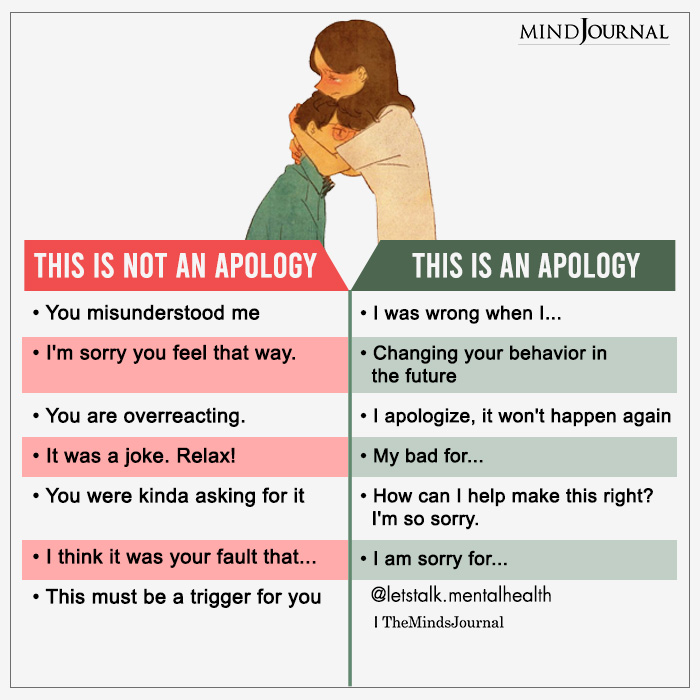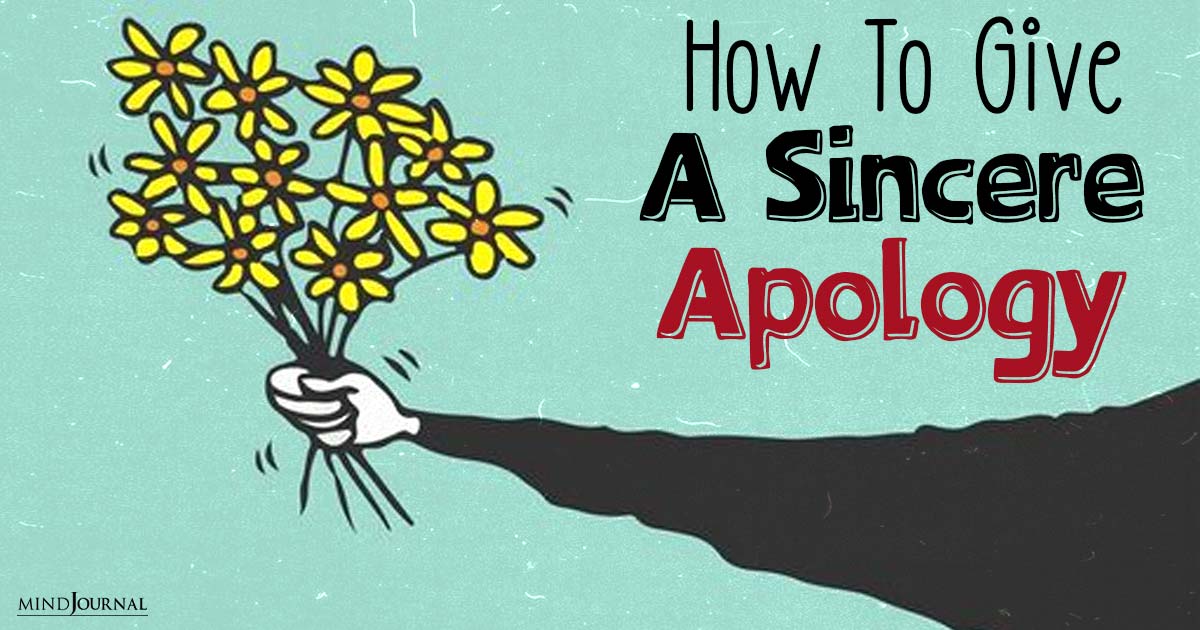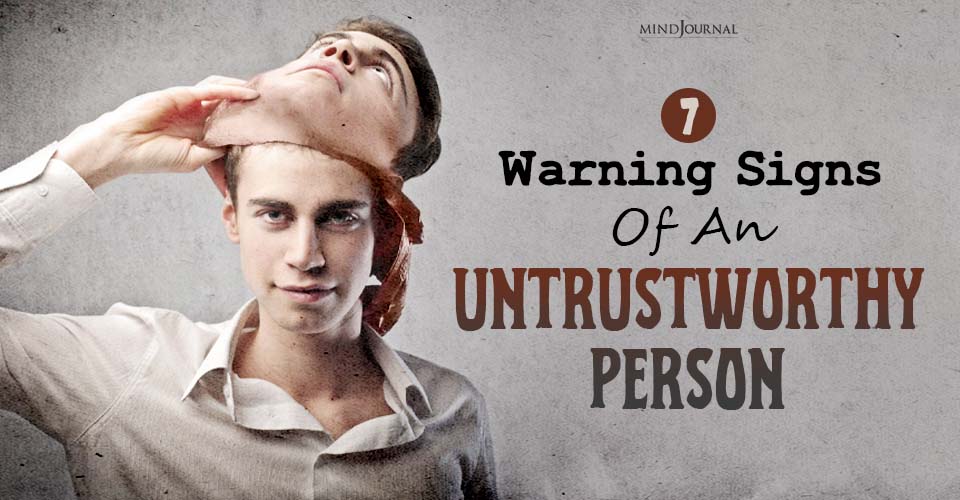We all know that relationships can be tricky. Sometimes, we mess up and hurt the people we care about. But fear not, my friend! There’s a powerful tool in our arsenal that can mend even the most strained relationships: a sincere apology. But, how to give a sincere apology?
A genuine apology has the superpower to heal wounds, rebuild trust, and bring harmony back into our lives. So, buckle up as we dive into the art of how to make a sincere apology.
Get ready for ten practical steps that will guide you through this journey of reconciliation and help you mend those broken bonds.
But before we get into the steps, let’s find out why it’s important to know how to make sincere apologies.
Related: The Power Of An Effective Apology: 7 Steps For Getting It Right
Why Is It Important To Apologize Sincerely?
Picture this: you accidentally step on your friend’s brand-new shoes. They’re understandably upset and hurt. Now, you have two choices: you can either shrug it off and pretend nothing happened, or you can apologize sincerely.
Here’s why a sincere apology is the way to go. First and foremost, it shows that you care. When you apologize sincerely, you’re acknowledging the impact your actions had on the other person. You’re saying, “Hey, I messed up, and I understand that I hurt you.” It’s a powerful way to validate their feelings and show that you value their emotions.
Sincere apologies also help to rebuild trust. When you make a mistake, it can strain the trust in a relationship. But when you apologize with genuine remorse, it shows that you’re willing to take responsibility for your actions.
It demonstrates that you’re trustworthy and committed to making things right. Trust takes time to build, and a sincere apology can be the first step toward repairing that trust.
Sincere apologies foster open communication. When you know how to give a sincere apology, it creates a safe space for both of you to express your feelings and concerns.
When you apologize sincerely, you’re inviting the other person to share their perspective and emotions. This open dialogue allows for a deeper understanding and can lead to a resolution that satisfies both parties.
Apologizing sincerely is also essential for personal growth. We all make mistakes, and a sincere apology gives you an opportunity to reflect on your actions and learn from them. It encourages self-awareness and helps you recognize patterns of behavior that you may need to change.

2 Types Of Apologies
Not all apologies are created equal, so buckle up and let’s explore the two main types: sincere and instrumental.
1. Sincere Apology
First up, we have a sincere apology. Picture this: your buddy calls you two hours late for your planned trip, all groggy and apologetic.
They genuinely recognize their mistake and feel terrible for making you worry while they were snoozing away. That’s a sincere apology. It’s when the person owns up to their fault and shows genuine remorse.
2. Instrumental Apology
Now, let’s talk about the instrumental apology. Ever had a little kid crash into you in the grocery store and mutter a quick “sorry” as they dart away? Or maybe a coworker carrying a ridiculous laundry basket full of rubber chickens bumped into you and half-heartedly said, “Oops, my bad”?
That’s an instrumental apology. It’s when the person apologizes for more out of fear of punishment or rejection rather than a true understanding of their actions.
So, why do sincere apologies matter? Well, when someone offers a sincere apology, it shows that they genuinely care about the impact of their actions. It’s a way of saying, “Hey, I messed up, and I get how it affected you.” Sincere apologies rebuild trust and create an open space for communication.
On the other hand, instrumental apologies can feel empty and insincere. They’re often used to dodge consequences or avoid getting in trouble. Let’s be honest, those apologies don’t hold much weight and can leave us feeling unacknowledged.
Now let’s explore the 10 best ways when it comes to how to give a sincere apology.
How To Give A Sincere Apology: 11 Best Ways To Do It
1. Reflect on your actions.
How to make a sincere apology? Let this be the very first thing you do.
Before you jump into the apology, take a moment to reflect on what you did wrong. Do some soul-searching, and try to understand why you need to apologize in the first place. Understand the impact your actions had on the other person.
This self-reflection is crucial for developing genuine remorse and empathy. Think about how your actions made them feel and what consequences they might have faced.
Related: Just Saying Sorry Isn’t Enough: 5 Steps To Apologize Meaningfully
2. Take responsibility for your actions.
Okay, it’s time to step up and own it. Accepting responsibility is key to a successful apology. No dodging or blaming others. No making excuses.
Be mature and admit your part in the situation. When you acknowledge your mistakes, it shows that you’re serious about making things right. Trust me, it takes guts to admit when we’re wrong and work on yourself to make sure that you never make the same mistake again.
3. Express genuine regret.
How to give a sincere apology? Do this!
Pour your heart out, and express your regret sincerely. Use words that come straight from the depths of your soul. Be specific about what you’re sorry for, showing that you understand the pain or hurt you caused.
Skip the generic “I’m sorry if I hurt your feelings” and go for something like, “I’m truly sorry for those hurtful comments I made. I now realize how much they must have hurt you, and I deeply regret my words.”
4. Show empathy to the person you hurt.
Imagine yourself in their position and try to understand everything from their point of view. Empathy is the secret sauce for rebuilding trust and strengthening connections. Let them know you genuinely care about their feelings and that you’re committed to making things right.
Show them that you’re not just sorry for the sake of it. Say something like, “I can only imagine how my actions made you feel. It must have been incredibly difficult, and I am genuinely sorry for putting you through that.”
5. Skip the excuses and qualifiers.
How to make a sincere apology?
When you’re apologizing, resist the temptation to make excuses or throw in qualifiers that undermine the sincerity of your words. Just focus on expressing your remorse and making the other person feel heard and understood. Leave out the justifications and minimize your actions.
Instead of saying, “I’m sorry, but I was having a bad day,” be brave and say, “I want to apologize without any reservations or excuses. What I did was inexcusable, and I take full responsibility for my actions.”
6. Make amends because actions speak louder than words.
How to apologize professionally? Make sure that your apology has some substance so that you can make things right. Think about what you can do to rectify the situation and address the needs of the person you’ve hurt. Get proactive and follow through with your promises.
It’s not just about saying sorry; it’s about taking meaningful steps to fix the damage. Ask them, “Is there anything I can do to make things right? I’m willing to do whatever it takes to repair the damage caused.”
Related: 13 Components Of An Effective Apology
7. Try to learn and grow from your mistakes.
Who says apologies can’t be opportunities for growth? Take a step back and reflect on the incident. What can you learn from it? Think about what you can do to make sure that you don’t make the same mistakes again in the future.
Show that you’re genuinely willing to grow from the experience and make the necessary changes. Share your insights with the person you apologized to, showing them that you’re committed to personal growth and positive change.

8. Give them some space.
How to make a sincere apology?
Now, don’t go rushing for an immediate response, once you have given your sincere apologies. After you’ve extended your apology, give the other person some space and time to process their emotions. Healing takes time, you know?
Respect their need for distance. Pressuring them for an instant reply may only hinder the reconciliation process. Let them come to terms with your apology in their own time, and be patient in awaiting their response.
9. Practice open and honest communication.
Communication is the key to a thriving relationship, even in the aftermath of an apology. Keep those lines of communication wide open throughout the reconciliation process. Encourage the other person to express their feelings and concerns, and make sure you listen attentively without getting defensive.
Honesty and transparency are crucial in rebuilding trust. Share your own emotions and be ready to answer any questions they may have. Let them know you’re fully committed to rebuilding the relationship.
10. Remember that patience and persistence pay off in the long run.
How to give a sincere apology? Remember this!
Rome wasn’t built in a day, right? Rebuilding trust and repairing a relationship takes time. So be patient and persistent in your efforts to mend the connection. Consistently show your commitment to change through your actions.
Allow the healing process to unfold naturally, understanding that it’s a journey with its ups and downs. Your dedication and sincerity will pave the way for a stronger and more resilient relationship in the end.
11. Learn to let go.
Apologies can be a powerful tool to maintain your integrity and mend relationships, but let’s face it, there are times when even the most sincere apologies fall short. It’s a tough pill to swallow, but sometimes the other person isn’t ready or able to forgive and move on.
They may hold onto their hurt or remain guarded, unable to fully open up. It can be frustrating, but remember, you can’t control their response.
You’ve done your part by offering a genuine apology, and that’s commendable. But if the other person doesn’t respond as you hoped, it’s essential to let it go for now. Sometimes healing takes time, and people need space to process their emotions. And hey, maybe they haven’t fully realized their own role in the conflict yet.
You only have control over your own actions, words, and intentions. If you’ve done everything you can to make amends, it’s time to focus on your own growth and well-being.
Related: “I’m Sorry, But…” 5 Signs Of A Manipulative Apology
How To Apologize Professionally?
Keep these 20-pointers in mind if you’re wondering how to apologize professionally.
- Begin by expressing your regret and acknowledging the mistake or offense.
- Use a professional tone and language throughout the apology.
- Instead of making excuses, learn to take responsibility for your actions.
- Be specific about what you’re apologizing for to demonstrate understanding.
- Offer a sincere and genuine apology without sounding insincere or robotic.
- Avoid blaming others or deflecting responsibility.
- Express empathy and understanding for the impact of your actions is one of the best ways if you’re thinking about how to apologize professionally.
- Be concise and to the point, focusing on the apology itself.
- Avoid excessive self-deprecation or minimizing the significance of the mistake.
- Highlight any steps you are taking to rectify the situation or prevent it from happening again.
- Be open to listening to the other person’s perspective and concerns.
- Demonstrate a commitment to learning from the mistake and improving in the future.
- Apologize directly to the affected individual or group.
- Use proper grammar, punctuation, and spelling to maintain professionalism.
- Avoid excessive flattery or excessive use of formal language.
- Be aware of your tone of voice and body language when delivering a face-to-face apology.
- Provide a clear explanation if necessary, but keep the focus on the apology itself.
- Offer a solution or propose steps to rectify the situation, if applicable.
- Follow up with actions that align with your apology to rebuild trust.
- End the apology with a respectful closing, such as “Sincerely” or “Best regards.”

Statements You Should Never Use While Apologizing To Someone
1. “I’m sorry you got offended.” This gives off the message that the other person is at fault just because they got offended, and you conveniently dumped the whole responsibility on them.
2. “I’m sorry, but…” This can come across as insincere and diminish the impact of your apology.
3. “My intention was not to hurt you.” While this statement may be true, it doesn’t excuse the fact that you did cause harm.
4. “I am sorry, but none of it was my fault.” Maybe whatever happened wasn’t entirely your fault, but you need to take accountability of the fact that you played some part in it.
5. “I’m sorry, but you were also at fault.” Blaming the other person for their part in the situation takes away from the focus on your own actions.
6. “I am sorry, but you are the one who misunderstood me.” You are basically placing the entire blame on the other person, for not entirely thinking about your feelings, instead of taking responsibility for your communication.
7. “I’m sorry you feel that way.” This statement doesn’t acknowledge your role in causing the other person’s feelings.
8. “I’m sorry, but I had no choice.” This suggests that you didn’t have control over the situation when in reality you likely made choices that led to the situation.
9. “I’m sorry, I just had a bad day.” Although having a bad day may have contributed to your behavior, it doesn’t justify it.
10. “I’m sorry you got upset.” Rather than taking responsibility for your actions that caused the upset, this statement shifts the focus to the other person’s emotional state.
11. “I’m sorry, but I didn’t know any better.” This suggests that your lack of knowledge or understanding absolves you of any responsibility for your actions.
12. “I’m sorry, but I was just joking.” This statement can be perceived as insensitive and disregards the other person’s feelings.
13. “I’m sorry, but I didn’t think it was a big deal.” This statement minimizes the impact of your actions on the other person.
14. “I’m sorry, but am very stressed out.” Even though this may be the case, this does not excuse your negative behavior towards someone else.
15. “I’m sorry, but everyone makes mistakes.” This statement acknowledges that making mistakes is a common occurrence, but it doesn’t directly acknowledge the harm caused by the specific actions and doesn’t seem to express sincere regret.
Related: Why Men Struggle To Apologize
Conclusion
Now you’re armed with the secrets of how to give a sincere apology, remember that relationships aren’t always smooth sailing, but sincere apologies can be the wind that guides you back to calmer waters. So, embrace this opportunity to heal and strengthen your connections.
Apologize with genuine remorse, take responsibility, and make amends. Learn and grow from your mistakes, communicate openly and honestly, and above all, be patient and persistent. How to give a sincere apology is an art, and you’re on your way to becoming a master of it.










Leave a Reply